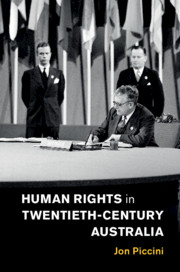Book contents
- Human Rights in Twentieth-Century Australia
- Human Rights in History
- Human Rights in Twentieth-Century Australia
- Copyright page
- Dedication
- Contents
- Acknowledgements
- Introduction: Bereft of Words
- 1 Inventing Rights
- 2 Cold War Rights
- 3 Experimental Rights
- 4 Whose Rights?
- 5 Implementing Rights
- Epilogue: Cascade or Trickle?
- Index
2 - Cold War Rights
Published online by Cambridge University Press: 20 September 2019
- Human Rights in Twentieth-Century Australia
- Human Rights in History
- Human Rights in Twentieth-Century Australia
- Copyright page
- Dedication
- Contents
- Acknowledgements
- Introduction: Bereft of Words
- 1 Inventing Rights
- 2 Cold War Rights
- 3 Experimental Rights
- 4 Whose Rights?
- 5 Implementing Rights
- Epilogue: Cascade or Trickle?
- Index
Summary
The Cold War threw Australian’s postwar hopes into stark relief. Social and economic rights became associated with a menacing global ideology, while the imperative of a new type of war saw political and civil rights challenged like never before. This chapter analyses the career of Australian civil libertarians in this decade, particularly in light of the 1949 trial of Communist Party of Australia leader Lance Sharkey for sedition and a 1951 referendum on whether to ban the party wholesale. While such moves drew calls of government hypocrisy in light of the recently passed Universal Declaration from civil libertarians, supporters could equally point to communism’s human rights abuses abroad. These usages commingled with and were enabled by earlier claims of British citizenship rights as instruments of political power and contestation. Similar problems emerged for Indigenous rights campaigners in the 1950s, who saw the UDHR as a roadmap for Indigenous equality. Such hopes soon gave way to the difficult reality of translating the Declaration's precepts into a very alien context and frustration at the limitations of their global influence or enforceability.
Keywords
- Type
- Chapter
- Information
- Human Rights in Twentieth-Century Australia , pp. 53 - 85Publisher: Cambridge University PressPrint publication year: 2019

